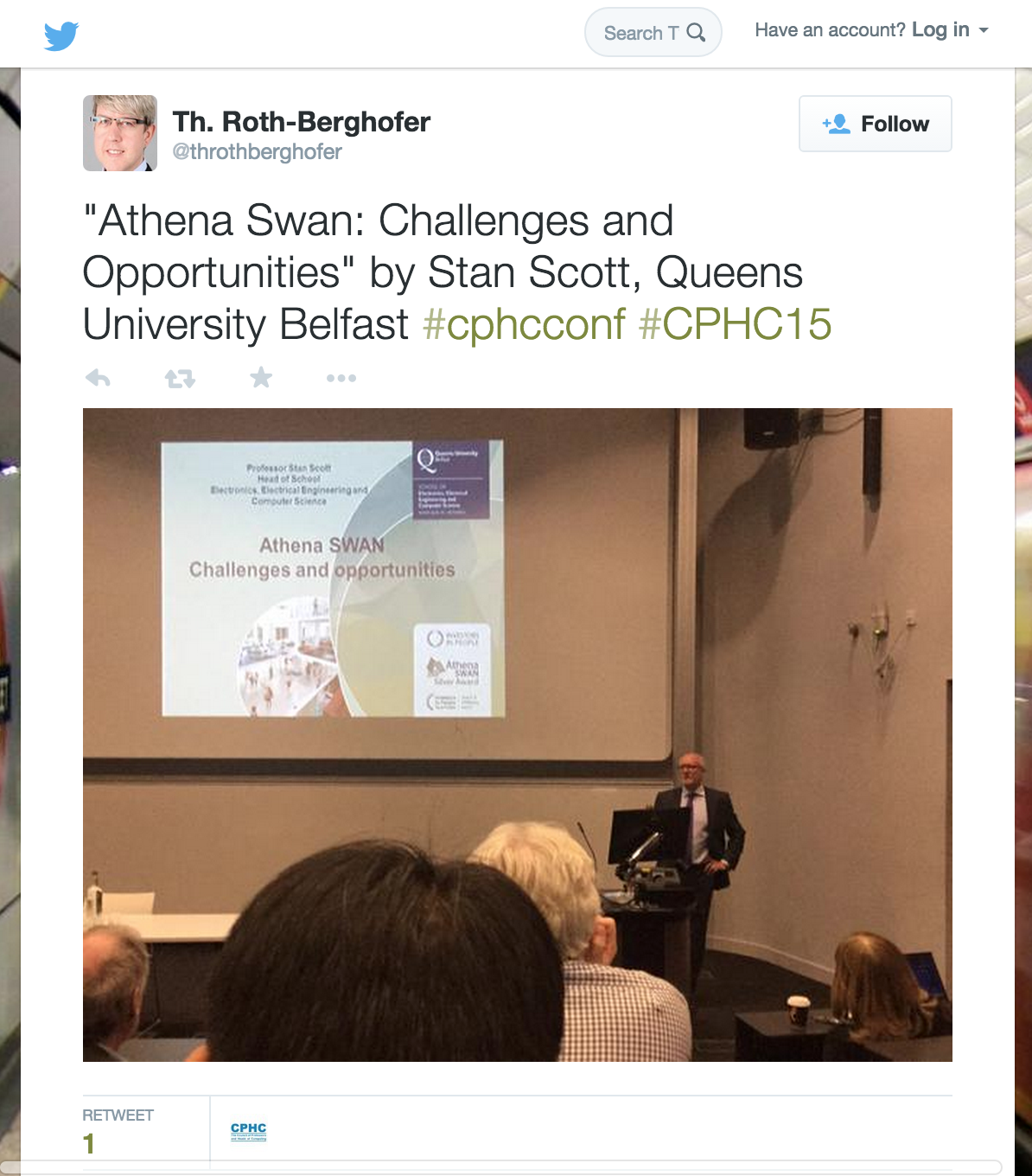 |
| Tweet from twitter.com/throthberghofer/status/592983514565496832/photo/1 |
Professor Stan Scott of Queens University Belfast’s
School of Electronics, Electrical Engineering and Computer Science speaks on “Athena SWAN: Challenges and opportunities” at the Council for Professors and Heads of Computing Conference at Queen Mary University of London.
Pointing out that 51% of the population are women, and only 14% are vice chancellors of universities, and 23.6% registrants for the current CPHC conference, the presentation started out by reiterating the claim that women are the largest untapped reservoir of talent in the world.
Bachelor students in Informatics number 835,000. The percentage of women students studying informatics BSc degrees is around 15% in the UK and about 30% in Turkey. The figure is 20% for MSc degrees in the UK. In the US, there is a downward trend starting in the early 80s, corresponding to the introduction of the personal computer, possibly due to marketing.
Professor Scott proceeded to give a brief history of Athena SWAN in the UK. The Equality Challenge Unit was launched on 22 June 2005, with the first awards conferred 2006. There are now 128 Athena SWAN members (6 Silver, 80 Bronze). The exercise will extend to Arts, Humanities, Social Sciences, Business, and Law in April 2015. In January 2013, Research Councils UK sent a letter to vice chancellors throughout the UK saying that those in receipt of RC funding must embed equality and diversity in all aspects of research practice as evidenced by participation in schemes such as Athena SWAN, Project Juno, Investors in People, Stonewall Diversity Champions.
He then shared Queen’s University Belfast’s experience with achieving and keeping the Silver award. The university itself has an institutional Silver award that was recently renewed; two schools have Gold Awards (Psychology and Biological Sciences), and nine Silver. Key to their success has been significant institutional support, Head of School support and an enthusiastic and committed SAT, and SWAN Champions and role model. Each school has two Champions, at the university level, there is a SWAN Champions Group, and at the management level, there is a SWAN Steering Group, which reports to, and receives guidance from, the vice chancellor.
The School, which is large and spread out over three buildings, had set out as its mission three goals: (1) to create a culture that attracts women students and staff; (2) to remove obstacles to women joining and staying; and, (3) to integrate gender equality and wider diversity into all aspects of school business. The SAT consisted of a gender balanced collection of Professors, lecturers, a senior engineer, students (UG and PGR), business and school managers, and administrative and marketing staff. Key SWAN themes included attracting women students and staff, career advice and support to women students and staff, making the school a good place to study/work for women students and staff. Example activities included an audit of the website and brochures to ensure that they are women friendly, providing women applicants with information on SWAN activities, introducing a staff charter making clear what what staff can expect from line managers and vice versa, providing leadership training and development, maintaining a staff mentoring scheme, and scheduling events in support of employee wellbeing.
In conclusion, Professor Scott points to the fact that the problem remains that very few women apply to academic positions in electronic and electrical engineering and computer science. There needs to be rigorous review and placement of advertisements, unconscious bias training for all staff, and active promotion of flexible working and part-time positions.